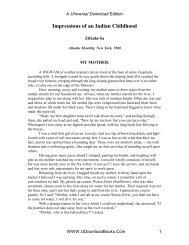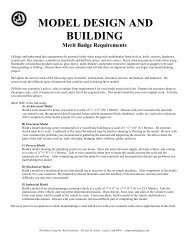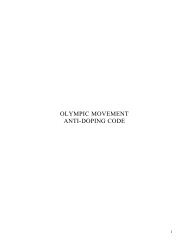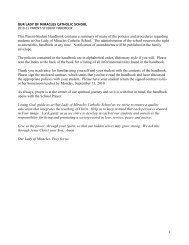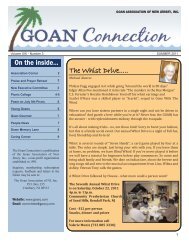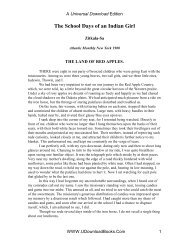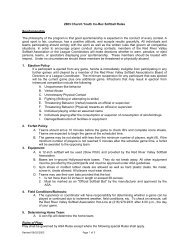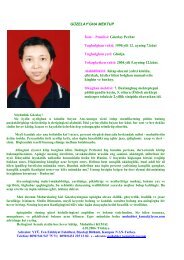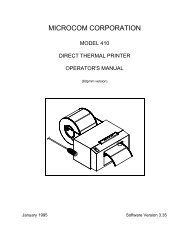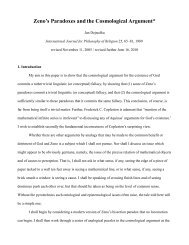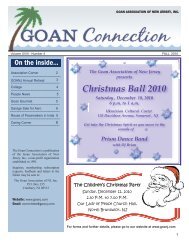Dummett's Backward Road to Frege and to Intuitionism - Tripod
Dummett's Backward Road to Frege and to Intuitionism - Tripod
Dummett's Backward Road to Frege and to Intuitionism - Tripod
Create successful ePaper yourself
Turn your PDF publications into a flip-book with our unique Google optimized e-Paper software.
think <strong>Frege</strong> would clearly agree. <strong>Frege</strong> never calls senses objects or functions, but he does call them<br />
indirect references. <strong>Frege</strong> never calls <strong>to</strong>nes or forces objects or functions, <strong>and</strong> he does not even call<br />
them indirect references. The reason that they are not even indirect references is simple. <strong>Frege</strong> requires<br />
a systematic reference shift from cus<strong>to</strong>mary references <strong>to</strong> indirect references <strong>to</strong> preserve truth-<br />
functionality in (what would otherwise be) referentially opaque contexts. And this makes sense only if<br />
senses are the indirect references. It would be absurd <strong>to</strong> think that a shift <strong>to</strong> forces or <strong>to</strong>nes could<br />
adequately solve the problem of referential opacity. For our statements of thought <strong>and</strong> belief would<br />
then be referring <strong>to</strong> entities our thoughts <strong>and</strong> beliefs are simply not about, <strong>and</strong> cannot be about, in the<br />
opaque contexts in question, so that truth is not preserved. For example, I happily assert I believe that<br />
Hesperus is identical <strong>to</strong> Phosphorus. It makes sense <strong>to</strong> say the references of “Hesperus” <strong>and</strong><br />
“Phosphorus” shift from their cus<strong>to</strong>mary references <strong>to</strong> their senses, <strong>and</strong> that I am happily asserting my<br />
belief that these senses single out the same reference. But it makes no sense <strong>to</strong> say these names’<br />
references shift from their cus<strong>to</strong>mary references <strong>to</strong> the force of assertion or <strong>to</strong> the <strong>to</strong>ne of happiness.<br />
Could I have been happily asserting my belief that, say, assertion is identical <strong>to</strong> happiness, or at least<br />
my belief that assertion <strong>and</strong> happiness single out the same reference? Does “Hesperus” shift reference<br />
<strong>to</strong> the force, <strong>and</strong> “Phosphorus” <strong>to</strong> the <strong>to</strong>ne? Or do both names shift reference <strong>to</strong> forces? —Which<br />
forces? If I am not happily asserting my tau<strong>to</strong>logical belief that assertion is identical <strong>to</strong> assertion, then<br />
what is the other force, <strong>and</strong> which name refers <strong>to</strong> it? If, say, “Phosphorus” shifts reference <strong>to</strong> the force<br />
of comm<strong>and</strong>, am I asserting my belief that assertion is identical <strong>to</strong> comm<strong>and</strong>? The same problems arise<br />
if both names shift reference <strong>to</strong> <strong>to</strong>nes.<br />
When we indicate forces or <strong>to</strong>nes, are we referring <strong>to</strong> them? If we are, then our sentence has as<br />
yet no force or <strong>to</strong>ne. We can make assertions about assertion <strong>and</strong> we can talk happily about happiness.<br />
But the mere fact that we are referring <strong>to</strong> assertion or <strong>to</strong> happiness does not ensure that we are not, say,<br />
asking questions about them or speaking sadly about them instead. And if we are not referring <strong>to</strong> forces<br />
54




